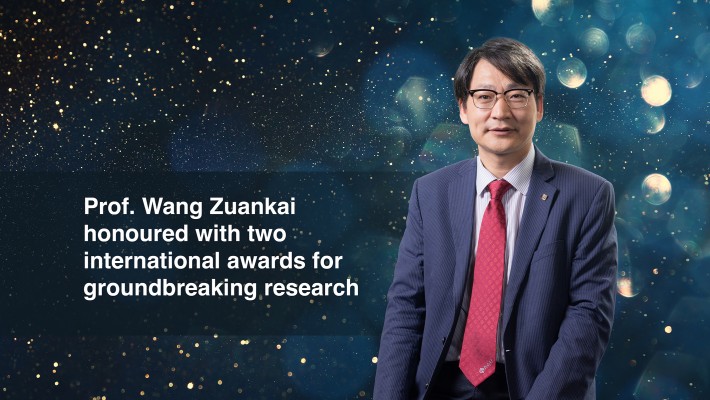Breakthrough in nano-energy and interfacial engineering garners international accolades
Innovations at the intersection of nature and engineering are driving transformative advances in energy harvesting and thermal-fluid sciences. Recent international accolades have shone a spotlight on pioneering research that harnesses the power of nature-inspired design to address global sustainability challenges.
Professor Wang Zuankai, Associate Vice President (Research and Innovation), Dean of Graduate School, Kuok Group Professor in Nature-Inspired Engineering, and Chair Professor of Nature-Inspired Engineering at PolyU, has proudly received two of the most prestigious awards in nano-energy and interfacial engineering. These are the Nano Energy Award, presented biennially at the International Conference on Nanoenergy and Nanosystems (NENS), and the Micro Flow and Interfacial Phenomena (µFIP) Prominent Research Award, recently conferred at a conference held at the University of California, Santa Barbara.
The Nano Energy Award, established in 2012, recognised Professor Wang for his groundbreaking advancements in nature-inspired interfacial engineering for sustainable energy harvesting. His innovations in droplet-based electricity generators and the integration of multiple energy conversion processes have fundamentally shifted the landscape of scalable energy solutions. By leveraging classical scientific principles alongside nature-inspired mechanics, his designs enable highly efficient energy harvesting from water, sunlight, and heat, pushing the boundaries of conventional energy technology.
The µFIP Prominent Research Award honours Professor Wang’s influential work in thermal-fluidics. His development of dynamic, nature-inspired surfaces that dynamically modulate interfacial and transport processes, such as wetting, adhesion, and thermal-fluid transport has broad applications, from energy harvesting and thermal management to flexible electronics, showcasing important practical advances in the field.
These honours not only recognise Professor Wang’s significant contributions to fundamental science and engineering but also reflect the University’s commitment to fostering interdisciplinary research with real-world impact.
Professor Wang remarked, “These recognitions reaffirm the significance of fusing fundamental material innovations with real-world engineering pragmatism. Breakthroughs often emerge at the intersection of disciplines, and this continues to inspire me to bridge laboratory discoveries with practical solutions for a sustainable future.”






